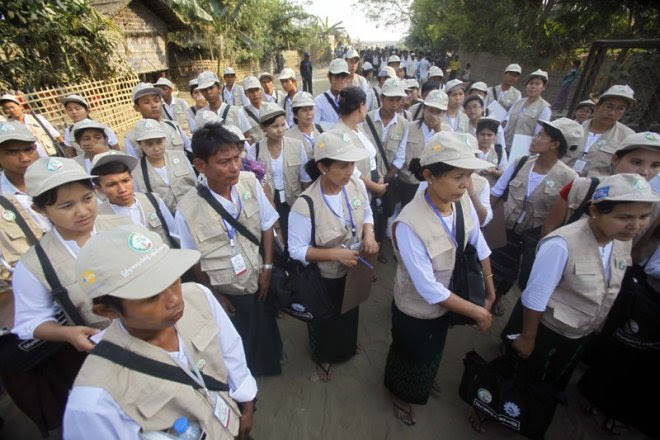Apparent backtracking has taken place when it comes to allowing respondents to self-identify their ethnic background in Myanmar's first census for more than thirty-years. Data collection began on March 30 and will continue until April 10 but reports from Rakhine state suggest that census collectors are ignoring answers of 'Rohingya' and preferring to leave the section blank.

In Sittwe, on March 30 at about 4pm, data collection began in the village of Basara, home to a number of the community of people who follow the Islamic faith and prefer to self-identify their ethnicity by using the term 'Rohingya'. There are 41 items to be completed on all census forms, including question for identifying as one of the 135 'races of the Union of Myanmar' as defined in the 1982 'Citizenship law' or supposedly to self-identify as one chooses.
Hamid Dusai, a villager of Basara said "when the census was taken at our village they asked every other question but omitted the one on race. When I challenged them on this they said 'they would be back again.'"
Mohamed Ta-Ci is one of the ten interpreters helping those that speak the Rohingya language but not Myanmar.
"I don't know what to do," he said, "when I say Rohingya they [the data collectors] just skip it."
"Answer 'Rohingya' in the place for Race.' was seen graffiti tagged on a wall in Bu Min village, Sittwe.
Instructions for census enumerators to ignore self-identification of anyone claiming the title of Rohingya appear to have come in light of new government instructions that have placated the All Rakhine Committee for the Census (ARCC). The ARCC have cancelled their planned boycott of the census following an announcement signed and issued by U Kyaw Yin Oo, the secretary of census taking supervising committee of Rakhine state.
"Since the government does not accept the usage of the word 'Rohingya' it will not be an acceptable response to the question concerning ethnicity."
U Win Hlaing Oo, assistant director of the Immigration and National Registration Department who was on site at the census-taking told Mizzima; 'there is no race, called the Rohingya in Myanmar, so respondents must answer with the correct name of their race."
Some reports have already suggested that on March 29, Ye Htut, the presidential spokesman, announced "It will be acceptable if they write 'Bengali' [a term that reinforces the Rohingya's links with the people of Bangladesh and their lack of recognised citizenship] we won't accept them as 'Rohingya'".
The British Embassy protested this decision "The [Myanmar] government has committed to run the census in line with international standards, including allowing all respondents the option to self-identify their ethnicity. We are concerned by recent reports that this may not be met."
Following the recent attacks on international aid agencies' offices, and the withdrawal of aid workers from Rakhine, Human Rights Watch appealed to the government to postpone the nationwide count.
Rakhine is not the only state to have already run into issues. In Kachin state it has already been decided that the census will only take place in government controlled areas, those currently under the control of the Kachin Independence Organisation (KIO) will not be reviewed.
In front line areas where controlled is split between the Tatmadaw and KIO, Ma Khon Ja of Kachin Peace Network said, " The census will be taken according to the security conditions at the time."
In these areas that include gold, jade and amber mines "If there is no offensive from the Tamadaw, then administrators of township will make a decision as to whether they should progress."
There have also been reports of mistakes in the coding of ethnic groups, "many things are controversial" said Ma Khon Ja, "Gay ba tribes have been listed as a sub-division of Kayah when they should be found within the Kayah group."
The census which is been delivered at a cost of US$5.86 million has received funding from Australia, Finland, Germany, Norway, Sweden, Switzerland and the United Kingdom.



